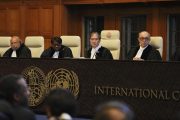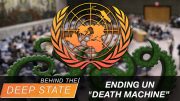Even as states reimpose lockdowns in an effort to stem the tide of COVID-19 cases, the World Health Organization (WHO) is urging officials to eschew such tactics because of their devastating worldwide effects.
“What we want to try to avoid — and sometimes it’s unavoidable and we accept that — but what we want to try and avoid is these massive lockdowns that are so punishing to communities, to society and to everything else,” WHO Health Emergencies Program executive director Mike Ryan said Friday.
Ryan made this remark “the day after the WHO reported a record one-day increase in global coronavirus cases,” wrote Reuters. Ryan was almost certainly trying to calm the nerves of jittery governments who view the rise in cases — up to 90 percent of which could be false — as cause for alarm.
Ryan’s position is clearly that of the WHO as a whole. In a video interview with the Spectator, David Nabarro, WHO special envoy for COVID-19, proclaimed, “We in the World Health Organization do not advocate lockdowns as the primary means of controlling this virus. The only time we believe a lockdown is justified is to buy you time to reorganize, regroup, rebalance your resources, protect your health workers who are exhausted, but by and large, we’d rather not do it.”
In other words, unless your citizens are dropping like flies and your healthcare system is overwhelmed, don’t shut things down.
The WHO believes that only a tenth of humanity has been exposed to COVID-19, so the virus is going to be with us for a long time to come, Nabarro said. “We really do have to learn how to coexist with this virus in a way that doesn’t require constant closing down of economies,” he averred, urging governments to pursue a “middle path [that] is about being able to hold the virus at bay whilst keeping economic and social life going.”
The “middle path,” he explained, consists of “testing, contact tracing, and isolation” of infected individuals, an approach that still has its pitfalls and allows much room for authoritarianism, but is considerably better than forcing businesses and churches to close and people to stay home, where their immune systems suffer and their addictions and mental maladies spiral out of control.
The problems extend far beyond the borders of the states and countries that are locked down, noted Nabarro. “Just look what’s happened in the tourism industry, for example, in the Caribbean or in the Pacific because people aren’t taking their holidays. Look what’s happened to smallholder farmers all over the world…. Look what’s happening to poverty levels. It seems we may well have a doubling of world poverty by next year. We may well have at least a doubling of child malnutrition.”
The United Nations Children’s Fund (UNICEF), a sister agency of the WHO, is forecasting that as many as 132 million people worldwide could go hungry as a result of the lockdowns. As of late July, the agency was already claiming that 10,000 children a month were starving to death and an another 550,000 a month were suffering from severe malnutrition because of the coronavirus and associated restrictions.
“This is a terrible, ghastly, global catastrophe,” declared Nabarro.
The WHO is hardly blameless when it comes to this disaster. Back in March, Director-General Tedros Adhanom Ghebreyesus warned governments not to lift their lockdowns too soon lest the dreaded “second wave” of the virus emerge, although he did caution against repeatedly tightening and loosening restrictions. The agency has also changed its tune on such things as the effectiveness of masks, an about-face that it did not deny was the result of political pressure.
So when the WHO makes a commonsense recommendation that flies in the face of what most governments desire, the jig is plainly up. The globalists at the WHO know the lockdowns they once favored are eventually going to be fingered as the cause of mass poverty and starvation, and they don’t want to be blamed.
“We really do appeal to all world leaders: Stop using lockdown as your primary control method,” implored Nabarro. “Remember, lockdowns just have one consequence that you must never, ever belittle, and that is making poor people an awful lot poorer.”




